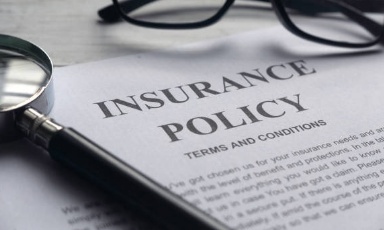⭐ ⭐ Introduction
It is crucial to have the right insurance policy in order to protect ourselves against unexpected events and financial losses. However, choosing the perfect insurance policy can be a daunting task. This comprehensive guide will walk you through the process and help you make an informed decision.
⭐ Understanding Insurance Basics

★ What is insurance?
Insurance is a contract between an individual or entity and an insurance company, where the individual pays regular premiums in exchange for financial protection against certain risks or losses.
★ Different types of insurance policies
There are various types of insurance policies available to meet different needs. These include life insurance, health insurance, homeowner’s insurance, auto insurance, and disability insurance, among others.

★ Insurance terminologies demystified
The insurance industry has its own set of terminologies that can often be confusing. Understanding these terms is essential when choosing the right insurance policy. Some common terms include premiums, deductibles, coverage limits, exclusions, and policy conditions.
⭐ Assessing Your Insurance Needs

Before selecting an insurance policy, it is important to assess your specific insurance needs.
★ Determining your assets and liabilities
Evaluate your financial situation by identifying your assets, such as properties, vehicles, and savings, as well as your liabilities, such as debts and financial obligations.
★ Identifying risks and potential threats
Analyze potential risks and threats that could impact your financial stability. This includes assessing risks related to health, property, and daily activities.
★ Evaluating personal and financial goals
Consider your personal and financial goals when choosing an insurance policy. For example, if you have dependents, ensuring their financial security in the event of your untimely death may be a priority.
⭐ Researching Insurance Providers
Before finalizing an insurance policy, it is vital to research the insurance providers in the market.
★ Factors to consider in choosing an insurance company
Take into account factors such as reputation, financial stability, customer service, and claims handling when selecting an insurance company.
★ Comparing policies and coverage options
Compare different insurance policies and coverage options offered by various insurance providers. Assess the benefits and limitations of each policy to find one that aligns with your specific needs.
★ Reading reviews and seeking recommendations
Read reviews and seek recommendations from friends, family, or experts in the field. This can provide valuable insights into the experiences of others with a particular insurance provider.
⭐ Types of Insurance Policies

★ Life insurance
Life insurance provides financial protection to your loved ones in the event of your death.
1. Term life insurance
Term life insurance offers coverage for a specific period, typically ranging from 10 to 30 years. It generally provides a death benefit to beneficiaries if the insured passes away within the policy term.
2. Whole life insurance
Whole life insurance is a type of permanent insurance that provides coverage for the entire lifetime of the insured. It also builds cash value over time, which can be accessed during the insured’s lifetime.
3. Universal life insurance
Universal life insurance offers flexibility in premium payments and death benefit coverage. It allows policyholders to adjust their premiums and death benefits to meet their changing financial circumstances.
★ Health insurance

Health insurance covers medical expenses and provides financial protection against high medical costs.
1. Understanding different types of health insurance plans
There are various types of health insurance plans, such as health maintenance organizations (HMOs), preferred provider organizations (PPOs), and high-deductible health plans (HDHPs). Each plan has its own features and benefits.
2. Evaluating coverage limits and exclusions
Carefully review the coverage limits and exclusions of a health insurance policy to ensure it meets your specific healthcare needs. Pay attention to items such as pre-existing condition exclusions and maximum coverage limits.
★ Homeowner’s insurance
Homeowner’s insurance protects your home and personal belongings against unexpected events, such as fire, theft, or natural disasters.
1. Coverage options for home and belongings
Homeowner’s insurance policies offer different coverage options, including dwelling coverage (for the physical structure of your home), personal property coverage (for your belongings), and additional living expenses coverage (if your home becomes uninhabitable).
2. Additional coverage for natural disasters or theft
Consider additional coverage options for specific risks, such as flood insurance or earthquake insurance, depending on your location. You may also want to add coverage for high-value items, like jewelry or fine art.
★ Auto insurance
Auto insurance provides financial protection against damages or injuries resulting from a car accident.
1. Minimum requirements
Each state has specific minimum requirements for auto insurance coverage. Familiarize yourself with these requirements to ensure compliance.
2. Optional coverage for comprehensive protection
Consider optional coverage options, such as comprehensive coverage (for damages not caused by a collision) or uninsured/underinsured motorist coverage (for accidents involving drivers without adequate insurance).
★ Disability insurance

Disability insurance offers income protection in case you become disabled and are unable to work.
1. Short-term disability insurance
Short-term disability insurance provides replacement income for a limited period, usually up to a few months.
2. Long-term disability insurance
Long-term disability insurance provides ongoing replacement income if you are unable to work for an extended period, typically more than six months.
⭐ Determining Coverage and Deductibles
Determining the appropriate coverage and deductibles for your insurance policy is crucial.
★ Evaluating insurance policy limits
Assess your specific needs, assets, and potential risks to determine the appropriate coverage limits for your insurance policies. This will ensure adequate financial protection in the event of a claim.
★ Understanding deductibles and their impact
Understand how deductibles work and consider your financial capabilities when choosing a deductible amount. A higher deductible typically results in lower premiums, but it also means you’ll need to pay more out of pocket before your insurance kicks in.
★ Balancing premiums versus coverage
Strike a balance between the cost of premiums and the level of coverage provided. Consider your budget and select a policy that provides the necessary protection without overburdening you financially.
⭐ Factors Affecting Insurance Premiums

Various factors can influence the cost of insurance premiums. It’s essential to be aware of these factors to make informed decisions.
★ Age and health
Younger individuals generally have lower insurance premiums, while older individuals may face higher premiums due to higher risks. Health conditions can also impact the cost of health or life insurance.
★ Occupation and lifestyle
High-risk occupations or lifestyles, such as hazardous jobs or extreme sports, may increase insurance premiums due to the associated risks.
★ Location and home security
The location of your home, including factors like crime rates, proximity to fire stations, or exposure to natural disasters, can affect homeowner’s insurance premiums. Additionally, having security measures in place, such as alarms or cameras, may lower premiums.
★ Driving record and vehicle type
A clean driving record with no accidents or traffic violations can result in lower auto insurance premiums. The type of vehicle you drive, including its make, model, and safety features, can also impact premiums.
⭐ Understanding Policy Exclusions and Limitations
Every insurance policy has exclusions and limitations that you should be aware of.
★ Common exclusions across various insurance policies
Insurance policies often exclude coverage for intentional acts, war, nuclear accidents, or existing damage. Familiarize yourself with these exclusions to fully understand the extent of your coverage.
★ Understanding policy limitations and conditions
Insurance policies may have limitations or conditions, such as waiting periods for certain coverage or specific requirements for filing a claim. Review these carefully to avoid any surprises later on.
★ Clarifying misconceptions about coverage
Misconceptions about coverage can lead to misunderstandings and disappointment during the claims process. Seek clarification from your insurance provider to ensure you have a clear understanding of the scope of your policy.
⭐ Considerations for Special Circumstances
Certain special circumstances require additional considerations when selecting an insurance policy.
★ Insurance for entrepreneurs and small business owners
Entrepreneurs and small business owners may need specialized insurance coverage, such as professional liability insurance or business interruption insurance, to protect their business interests adequately.
★ Insurance for frequent travelers or expatriates
Frequent travelers or expatriates may require international travel insurance or expatriate insurance to cover medical emergencies or unexpected travel disruptions.
★ Insurance considerations for families with dependents
Families with dependents should prioritize life insurance coverage to ensure their loved ones are financially protected in the event of their passing. Additionally, considering disability insurance can provide income replacement if the breadwinner becomes disabled.
⭐ Evaluating Financial Stability of Insurance Companies
The financial stability of an insurance company is crucial to ensure it can fulfill its obligations.
★ Financial ratings and evaluations
Review the financial ratings and evaluations of insurance companies provided by independent rating agencies, such as Standard & Poor’s or A.M. Best. These evaluations can help gauge the company’s financial strength and ability to pay claims.
★ Insurance company’s ability to pay claims
Research the claims payment history and investigate any issues or complaints related to claim processing. Choosing an insurance company with a solid track record of paying claims offers peace of mind.
★ Monitoring company’s track record
Track the performance and customer satisfaction levels of insurance companies over time. This can help identify any potential red flags or changes in their financial stability.
⭐ Seeking Professional Advice
Obtaining professional advice can provide valuable insights and guidance during the insurance selection process.
★ Consultation with insurance agents or brokers
Consulting with insurance agents or brokers can help clarify any doubts, explain policy features, and provide customized recommendations based on your specific needs.
★ Benefits of working with an independent insurance advisor
Engaging an independent insurance advisor can offer unbiased advice and options from multiple insurance providers. They can help compare policies and find the best-fit solution for you.
★ Analyzing insurance advice obtained
Consider all professional advice received and critically analyze its relevance to your situation. Remember that the final decision rests with you, and it is essential to choose the insurance policy that aligns with your unique requirements.
⭐ Reviewing Policy Renewal and Amendment Flexibility
Understanding the terms and conditions of policy renewal and amendment is crucial for long-term satisfaction.
★ Understanding policy renewal terms and conditions
Become familiar with the terms and conditions surrounding policy renewal, including any changes in premium rates or coverage options. This will help you make an informed decision when renewing your policy.
★ Flexibility to amend or upgrade coverage
Ensure that the insurance policy allows for flexibility to amend or upgrade coverage as your needs change over time. This can help you adapt your policy to evolving circumstances without the need for a complete policy change.
⭐ Importance of Reading and Understanding the Policy Document
Thoroughly reading and comprehending the policy document is vital to avoid any surprises or misunderstandings.
★ Essential components of an insurance policy
The policy document contains essential information, including coverage details, exclusions, limitations, terms, and conditions. Pay close attention to these components to fully understand your rights and responsibilities as the policyholder.
★ Clarifying doubts and seeking explanations
If you come across any clauses or terms that are unclear or confusing, contact your insurance provider for explanations. It is essential to have a clear understanding of your policy to avoid any unexpected surprises.
⭐ ⭐ Conclusion
Choosing the right insurance policy requires careful consideration of your individual needs, risks, and financial goals. By understanding insurance basics, researching insurance providers, and thoroughly evaluating your options, you can make an informed decision and find the perfect insurance policy to protect yourself and your loved ones.
⭐⭐⭐ Frequently Asked Questions (FAQs) 🤔❓
A. What are the crucial factors to consider before purchasing an insurance policy❓
🙋 Before purchasing an insurance policy, consider crucial factors like your coverage needs, deductibles, policy limits, premium costs, the reputation of the insurance company, and the terms and conditions of the policy.
B. How can I save money on insurance premiums without compromising coverage❓
🙋 To save money on insurance premiums without compromising coverage, you can compare quotes from multiple insurers, raise deductibles, bundle policies, maintain a good credit score, and ask for available discounts.
C. Are there any specific exclusions I should be aware of while selecting an insurance policy❓
🙋 Yes, while selecting an insurance policy, be aware of specific exclusions, which are situations or conditions not covered by the policy. Understand the limitations to ensure adequate coverage.
D. What steps can I take to ensure hassle-free claim processing❓
🙋 To ensure hassle-free claim processing, report any incidents promptly, provide accurate information and documentation, cooperate with the insurance company, and follow their claim procedures.
E. How often should I review and update my insurance policy❓
🙋 It is recommended to review and update your insurance policy annually or whenever significant life changes occur, such as marriage, home purchase, or changes in income.
F. Is it possible to switch insurance providers mid-policy❓
🙋 Yes, it is possible to switch insurance providers mid-policy. However, consider any cancellation fees and ensure continuous coverage before terminating the current policy.
G. Are there any insurance options available for high-risk individuals❓
🙋 High-risk individuals may have insurance options available, such as high-risk auto insurance, non-standard homeowners insurance, or specialized health insurance plans tailored to their needs.










